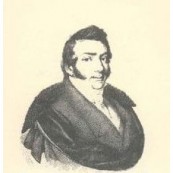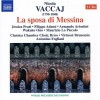传记
Nicola Vaccai (15 March 1790 - 5 or 6 August 1848) was an Italian composer, particularly of operas, and a singing teacher.
Born at Tolentino, he grew up in Pesaro, and studied music there until his parents sent him to Rome to study law. Having no intention of becoming a lawyer, he took voice lessons and eventually studied counterpoint with Giuseppe Jannaconi, an important Roman composer. When Vaccai turned twenty one, he went to Naples and became a disciple of Paisiello, whose Barber of Seville was considered a comic masterpiece until Rossini's Barber swept it from the stage 35 years later.[1]
Vaccai launched his career in Venice, initially earning his living by writing ballets and teaching voice. He had his first operatic success with I solitari di Scozia in Naples in 1815. In Parma he was commissioned to write Pietro il grande, where he was also one of the soloists in the first performance. This was followed by Zadig e Astartea (Naples, 1825) and then his best known opera Giulietta e Romeo (Milan, 1825).
Vaccai's sojourn in London began with a production of his most successful opera, Romeo and Juliet, at Kings Theatre in April, 1832. His charm and continental reputation ingratiated him to society and soon he was much sought after as a teacher.
Ending his wanderings with a return to Italy, Vaccai became a director and professor of composition at the Milan Conservatory in 1838. After six years he retired on account of poor health to his boyhood home, Pesaro, where he wrote his sixteenth opera. He died there in 1848.







